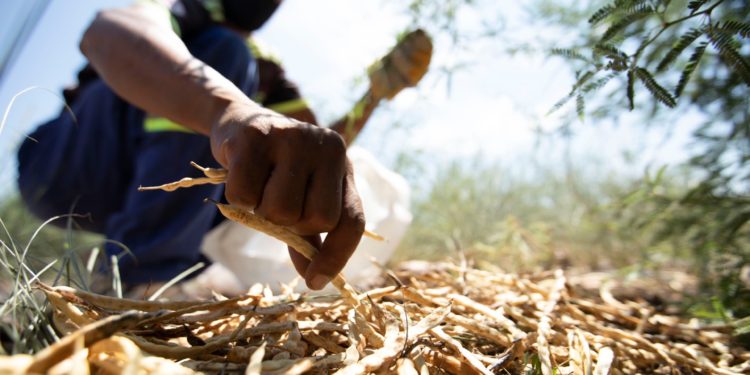By AL JAZEERA
Calvinia, South Africa – It’s 7:30am on a Monday and there’s already a queue of about 40 men, women and children against the wall of the still-locked warehouse. March temperatures in the South African backwater of Calvinia, some 430 kilometres (267 miles) north of Cape Town, average 30 degrees Celsius (86 degrees Fahrenheit) – but today an unseasonable cold front has everyone huddling together to keep warm. Wispy grey clouds blanket the usually-sunbaked Hantam Mountains and an empty chip packet skids past the police station across the road.
The crowd is waiting to sell mesquite seedpods to Brandt Coetzee, a burly 57-year-old Afrikaner who invented Manna Brew, a caffeine-free coffee substitute made from the roasted beans. The self-styled “superfood espresso”, which tastes earthy and slightly sweet, not only offers health benefits, but it also contributes to the eradication of an alien tree species that’s infesting the arid Northern Cape. And it provides an annual cash injection to about 700 people – in a town where only 36 percent of adults have formal employment. Perhaps most importantly, collecting the seeds before they are allowed to germinate saves billions of litres of groundwater every year.

The 15cm-long (six-inch-long) pods – some yellow and some purple, depending on the subspecies of mesquite – are stuffed into flour and fertiliser sacks, and ferried here on all manner of wheeled vehicles: homemade go-karts, plastic strollers, tatty wheelchairs and stolen shopping trolleys.
Coetzee only buys clean, dry pods, and a few in the queue are sorting their stashes – casting the twigs and pebbles aside on the potholed pavement. Others smoke or snooze while they wait for the steel doors to open.
Hans Gouws, a chipper 73-year-old in a luminous green hat, has brought three sacks this morning. He collected the pods with Gert Smit, 66, “near the One Stop” petrol station and they made the hour-long walk to the warehouse together. While both receive government pensions of 2,090 South African rand ($110) every month, the extra cash they earn from collecting seedpods helps them to support their grandkids. Last week, Gouws made about 250 rand ($13) every day from the seedpods, and he’s hoping for the same again today.
![Mesquite seedpods [Nick Dall/Al Jazeera]](https://www.aljazeera.com/wp-content/uploads/2024/03/IMG_5647-Manna-Brew-Nick-Dall-1711207556.jpg?w=770&resize=770%2C578)
At 8:30am, the warehouse doors rumble open, and suddenly the air is abuzz with noise and activity. First, the sacks of pods are emptied into plastic crates, where they undergo a quality check: During Al Jazeera’s visit, one farmer mistakenly brought in a sack of carob pods, and earlier in the harvest, a few chancers tried to increase their payout by putting bricks at the bottom of their sacks.
Jan Jochims, 43, watches intently as his stash is weighed. “I don’t have work,” he says in Afrikaans. “I live off the money the government pays for my children every month. You can’t find work here if you don’t vote for the ANC [African National Congress, the ruling party],” he mutters. He receives 510 rand ($27) in government grants for each of his four children, and his wife earns a further 920 rand ($49) every month for working as an orange packer two days a week. His sack of mesquite pods weighs 17.6kg (39 pounds), and he smiles as he’s handed 88 rand ($5) in cash. “This is good income,” he says. “Tonight, I will put food on the table for my children.”

Once the pods have been paid for – the details of each transaction are painstakingly recorded by hand – they are put into clean, branded sacks using a custom-welded funnel contraption, and sewn closed with a portable bag stitcher. Coetzee has employed 12 locals to manage this process, paying them each 300 rand ($16) per day – twice the going rate in Calvinia – for their efforts.
It’s hard, but they work quickly and enthusiastically. Willem Dewee proudly shows Al Jazeera his biceps, while Attie Koopman, 53, takes a break from sweeping the floor for a chat, “This is my third season working here,” he explains. “We were aiming to bring in 50 tonnes, but it seems like it’s going to be a bit more. The work is going great, we get on well together, and the payments are good. We are all happy.”
For the rest of the year, Koopman is jobless: “I get nothing from the state,” he explains. “I wouldn’t survive without the soup kitchen. That’s how I fill my stomach.”
![Attie Koopman [Nick Dall/Al Jazeera]](https://www.aljazeera.com/wp-content/uploads/2024/03/Attie-Koopman-Manna-Brew-Nick-Dall-1711209545.jpg?w=770&resize=770%2C553)
Seeds of change
The honey mesquite shrub – Prosopis glandulosa, native to Mexico and the southwestern US – was introduced to the Northern Cape, as well as neighbouring Namibia and Botswana, in the late 1800s. Its sweet seedpods were – correctly – viewed as excellent fodder for sheep and goats in the drought-stricken region.
But the animals did not digest the seeds and the trees grew quickly and took over. Today, approximately eight million hectares (20 million acres) of the Northern Cape are infested with mesquite. As the International Union for Conservation of Nature (IUCN) explained in its 100 of the World’s Worst Invasive Alien Species list, “Prosopis glandulosa forms impenetrable thickets that compete strongly with native species for available soil water, suppress grass growth and may reduce understory species diversity.” Other species on the list include the anopheles mosquito, the vector for malaria.

Coetzee’s love affair with these droopy, thorn-covered aliens began in 1996, when he was still living in Prieska, 400km (248.5 miles) northeast of Calvinia. Shortly after becoming president, Nelson Mandela launched the Reconstruction and Development Programme (RDP), a nationwide “socio-economic policy framework” that sought to “mobilise all our people and our country’s resources toward the final eradication of apartheid.” One RDP project employed about 150 local people to chop down mesquite trees in and around Prieska.
Coetzee, a third-generation entrepreneur, saw an opportunity in the piles of dead trees. When he asked the government what they planned to do with the wood, he was told that he was welcome to lead research into its possible uses. Working with the Council for Scientific and Industrial Research (CSIR), he put together a lengthy document of options. While Coetzee had gone into the project with dreams of using the trees for firewood or charcoal, he now set his sights on a higher goal. Mesquite trees have very hard wood that’s similar to Rhodesian teak, and he spent the next three years setting up a woodworking factory in Prieska. At its peak, he had 30 permanent employees and exported furniture to the US and other markets. The dramatic strengthening of the rand under President Thabo Mbeki led Coetzee to close the factory in 2004 because exports were no longer profitable.
But he wasn’t done with mesquite trees. Years working with them had made him acutely aware of the environmental threat they posed to his beloved Northern Cape – and their potential as drivers of job creation.
“I realised that cutting and poisoning the trees wasn’t the best way of controlling the infestation,” he explains in his gravelly baritone. “It cost government millions of rands, but the seeds from the regrowth replanted through animals’ droppings and the spread is now totally out of control.” Collecting the seedpods, he realised, was a much cheaper and more effective way of dealing with the problem.
![Mesquite shrubs [Courtesy of Brandt Coetzee]](https://www.aljazeera.com/wp-content/uploads/2024/03/Manna-Prieska-awe-38-of-84-Manna-Brew-Courtesy-of-Brandt-Coetzee-1711208059.jpg?w=770&resize=770%2C513)
Coetzee started working with the CSIR on a plan to use the pods to produce what they felt had the potential to be “the ultimate animal feed” due to the incredible nutritional qualities of mesquite seedpods. In fact, the test results were so promising that they started thinking about using the pods for human consumption. In his research, Coetzee read about the Pima Indians who have eaten mesquite seeds for generations. “When Pima Indians move to the US they start to develop Type 2 diabetes,” he explains. “But when they return to Mexico and start eating mesquite again the diabetes disappears.”
This prompted Coetzee to take the seedpods to the University of the Free State for further analysis. Based on their results, they encouraged him to take his product to market, but there was just one problem: “I have a background as a builder and entrepreneur,” he says with a laugh. “The pharmacists I was working with had loads of questions and I had to school myself in an entirely different world.”
In 2005 Coetzee launched Manna Blood Sugar Support capsules, a “natural way to support healthy blood sugar levels”, that’s targeted at Type 2 diabetics and those struggling with weight or cholesterol issues. The product has done extremely well in South Africa, selling approximately 120,000 jars a year, and it’s also received the green light from two independent, peer-reviewed scientific papers. A 2013 study that tested the product on rats found that “P glandulosa was cardioprotective and infarct sparing as well as anti-hypertensive without affecting the body weight or the intraperitoneal fat depots of the animals.”
So why the pivot to coffee?
“It’s really hard to export a natural product that makes health claims,” explains Coetzee. “It would take years to get approval.” He adds, “My main drivers are job creation and water conservation, so I needed something that could go truly global.” After 18 months of intense experimentation, he had a product that looked, behaved and tasted similar to coffee.
![Brandt Coetzee [Courtesy Brandt Coetzee]](https://www.aljazeera.com/wp-content/uploads/2024/03/Brandt-Coetzee-Manna-Brew-Nick-Dall-1711207484.jpg?w=770&resize=770%2C578)
When the whole seedpods arrive at the Manna Brew factory near Cape Town – a gleaming, sterile contrast to the bustle and grime of the Calvinia warehouse – they are cleaned and sorted before being roasted in a specially built oven. They are then milled, sieved and milled again. “Absolutely nothing is added,” stresses Coetzee. The powder can be brewed in an espresso machine, French press, stovetop or immersion-style coffeemakers and there’s also an on-the-go “teabag-style” product. Coetzee is currently developing coffee pods.
While Manna Brew is naturally caffeine-free, mesquite doesn’t contain caffeine, and it tastes remarkably similar to coffee: The adjectives “nutty” and “earthy” come to mind, and there’s a decided caramel aftertaste. Unlike coffee, there’s no acidity. The drink tastes great on its own but also goes with milk and milk substitutes. It’s gaining traction in South Africa where they’re currently selling about one tonne a month, both in restaurants and cafes and on retail shelves, and is being exported to Australia, the UAE and the US. “We’ve received loads of enquiries from the EU,” adds Coetzee, “But I’m still in the process of registering the mesquite pods as a novel food.”
Is he worried about competition? “We don’t have any patents,” says Coetzee. “Of course, guys will be copying us … What we have done is not easy.”
![Preparing Manna Brew coffee at home [Nick Dall/Al Jazeera]](https://www.aljazeera.com/wp-content/uploads/2024/03/1710748250059-Manna-Brew-Nick-Dall.-1711207459.jpg?w=770&resize=770%2C580)
Room to grow
Al Jazeera visited Calvinia on the last day of the harvest. It was meant to last two weeks, explains Coetzee, but his 50-tonne target was surpassed in just five days. “This is the third year we’re buying pods in Calvinia,” he explains, “So the people were expecting us. We’ve had lines around the block every day, and very few quality issues.”
At 11am, an 18-wheel truck owned by a local firm arrives to ferry about 30 tonnes of pods to the Manna Brew factory. Hendrik Isaacs, 44, had just sold 42.4kg (93 pounds) of pods for 212 rand ($11) when he was one of 10 people offered 300 rand ($16) to help load the truck. They all jumped at the opportunity, hurling the sacks onto the flatbed before sprinting back to the warehouse for the next load.
“School fees are getting more expensive every year,” says Isaacs. “We’ve got it heavy here in Calvinia. The kids need clothes, shoes, bread … I really need this money, it’s good money, it’s a life for us.” Isaacs, like everyone in the village Al Jazeera spoke to, doesn’t have a permanent job, although he does do occasional work on the nearby sheep farms and tending residents’ gardens.
Over the five days, 660 people sold a total of 56 tonnes of seedpods to Coetzee. When you factor in wages, rental and transport, the harvest injected about 350,000 rand ($18,650) into the local economy. It’s a much-needed boost for a province that is the third-poorest in the country and, by some measures, the least developed: The Northern Cape has more people living in informal dwellings (PDF), 12.1 percent, and fewer children attending pre-primary school, 43.3 percent, than anywhere else in the country. It’s the country’s least populous province, and many of its people believe they have simply been forgotten. Mining and agriculture are its two main sources of income. And agriculture is under pressure due to climate change.
![Sorting seedpods on the pavement [Nick Dall/Al Jazeera]](https://www.aljazeera.com/wp-content/uploads/2024/03/IMG_5654-Manna-Brew-Nick-Dall-1711207595.jpg?w=770&resize=770%2C578)
Coetzee, who comes from the Northern Cape, is well aware of these challenges – and of the limitations of Manna Brew’s impact. The world will need to drink a lot of mesquite coffee to stop the trees’ spread, and – even if demand skyrockets – the economic impact of the harvest will always be short-lived. But this doesn’t stop him from dreaming of a better future for the province that is so close to his heart. “This year we took in 56 tonnes at five rand ($0.27) a kilo,” he says. “Next year, we will definitely pay six rand ($0.32) a kilo. And if the coffee takes off, I might be able to buy 100 tonnes.”
Ten years from now, he hopes to be able to buy 1,000 tonnes at 10 rand ($0.53) a kilo. “If that happens we’d be able to work with towns across the region. And we’d have a real shot at getting the mesquite problem under control.”
It’s nice to dream but for now, he must get back to the business of making and selling Manna Brew – one cup at a time.







Discussion about this post